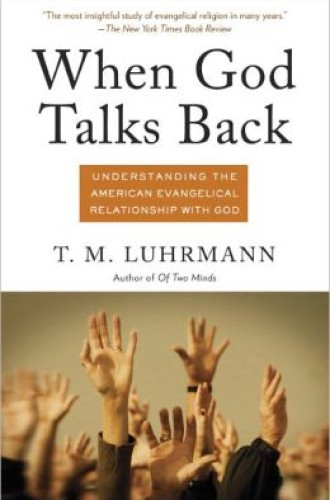God at hand
Why is it that when we talk to God we’re said to be praying,” Lily Tomlin once quipped, “but when God talks to us we’re schizophrenic?” That line undoubtedly played well in Cambridge, Madison and Berkeley. But that was before Tanya Luhrmann’s book exploded like a Roman candle in the review pages of the New Yorker, the New York Times and the New Republic. National Public Radio’s Fresh Air also featured the author. Little wonder. Luhrmann has won three prizes for a previous book, as well as a Guggenheim Fellowship and membership in the American Academy of Arts and Sciences. She now holds an endowed chair in anthropology at Stanford University.
In When God Talks Back, Luhrmann seeks to answer two straightforward questions. First: How are sensible people—people who get along perfectly well in the day-to-day world—able to believe in “an invisible being who has a demonstrable effect on their lives”? After all, they “cannot shake God’s hand, look God in the eye, or hear what God says with [their] ears.” The second question is: Why does belief in a loving personal God persist in the face of objective disconfirmation? Christians, like everyone else, suffer “the body blows of life: loved ones die before they grow old; good marriages end in divorce; dreams shatter on the rocks of circumstance.” So what would it take to make them reconsider? These are questions a social scientist can ask without passing judgment on the ontological reality of the God they claim to be thinking about.
Read our latest issue or browse back issues.
Luhrmann’s primary data came from two congregations of the Vineyard Christian Fellowship. She worshiped with the two groups for two years each. She sang their songs, attended their weekly Bible studies, kept a prayer journal and even retained a spiritual director. She spent hundreds of hours talking with members and reading their favorite authors, such as Rick Warren, Dallas Willard and Richard Foster.
The Vineyard is a loose network of churches started in California in the 1970s in the wake of the Jesus People movement. Mark Noll has described them as “evangelical, post-fundamentalist, soft charismatic, and therapeutically spiritual.” Members are preponderantly white, middle-class, college-educated and culturally centrist. Vineyard and Vineyard-like fellowships number thousands of congregations and millions of believers scattered across the United States. For economy Luhrmann simply calls them evangelicals.
So how did evangelicals develop their belief in an invisible God? Luhrmann argues that they created a space for him in their imagination. (She adopts her subjects’ use of the male pronoun in referring to God.) That did not mean that God was imaginary, but it did mean that he resided in a separate cognitive zone. They blurred the distinction between private and public, internal and external, self and not self. She calls it an “epistemological double register.” Luhrmann’s evangelicals endowed God with profoundly human characteristics. He wanted them to talk to him and he wanted to talk back. Many zealots felt his presence palpably, but whether they did or not, most desired “the hot presence of the Holy Spirit to brush their cheeks and knock them sideways.” God was deeply caring, never judgmental and endlessly forgiving.
Yet making God present and keeping him close did not come easily. Believers knew perfectly well that though God was “really real” he did not subsist like chairs and tables. So they schooled their minds to cultivate the space where God might be discerned. Some were naturally better at it than others, but everyone could learn. Luhrmann tells story after story of believers finding ways to galvanize God’s presence. Some efforts took the form of apophatic prayers, emptying the mind in order to let the divine flow in. Others took the form of kataphatic prayers, filling the mind with concrete images like favorite Bible stories or memories of sacred moments. Some of these efforts seemed—to outsiders anyway—utterly mundane. One zealot set out an extra cup of coffee for God, another spoke of going out with him on a “date night.” The key point is that “coming to a committed belief in God was more like learning to do something than to think something.” And it took work, lots of it.
The effort to keep God present likewise resided in evangelicals’ imagination. They not only talked to God but also asked him for specific things, like a particular car or admission to a particular college. This strategy invited disappointment. It was one thing to pray for world peace—one could always find calm somewhere—but quite another to pray for a demonstrable outcome that just as demonstrably may not come. Evangelicals like everyone else struggled with the “body blows of life.”
The point was clear. God wanted them to love him, “not for his stuff.” When there was no money to pay the rent—never mind getting into Stanford—the only recourse was to turn to the very source of their lives. That surely was the point of Job, one of the oldest stories of the Hebrew Bible. God did not answer Job’s questions, but he answered Job. For evangelicals the veil between the natural and the supernatural proved tissue thin. They reenchanted their world—not naively, but fully aware of the conceptual obstacles.
Believers understood the power of a tightly woven support system. They worshiped, sang, testified and studied the Bible together constantly—always on Sundays, of course, and often on weeknights too. Luhrmann pays special attention to two practices: the development of contemporary worship music and personalized Bible study. The former endeavor abjured traditional hymns, with their doctrinally subtle verses in favor of simple lyrics, frequently repeated, with accompaniment by drum and guitar and projection of the words on a screen. The lyrics resembled God himself: never judging, always affirming. They were rarely about God; instead, they were addressed to God. Bible studies abjured the traditional homiletic pattern of exegesis, doctrine and application as believers sought to hear God addressing them personally through the Bible’s pages.
Contrary to conventional wisdom, evangelicals were acutely aware that authentic experiences of God had to be distinguished from inauthentic ones, not to mention truly pathological ones. And so they sought to measure his utterances against multiple criteria. Is this the kind of idea I might come up with on my own? Is it possible that it has more to do with the burrito I had for lunch than with God’s special word for me? What does my worship community think? What do the people I trust think?
Context counted. Luhrmann argues that evangelicals’ beliefs and practices emerged from the confluence of definable historical tributaries, including classic Pentecostalism, Jesus People fervor, Billy Graham–style new evangelicalism, psychotherapeutic culture, bowling-alone individualism and the communications revolution. Not surprisingly, something like two-fifths of Americans have told pollsters they were evangelical, and the majority of those have sought a spirituality in which they experienced God “immediately, directly, and personally.”
The book’s virtues are many. One is the prose: mercifully free of social science jargon, it reads more like fiction than the deeply researched and subtly theorized work that it is. Wit abounds. “In his Confessions,” Luhrmann winks, “Augustine reports as an example of his sin that he stole some pears from a neighbor’s garden. . . . A modern reader familiar with the addiction narrative feels that Augustine was not exactly hitting bottom.” The erudition is staggering, reflecting a seamless integration of anthropology, psychology, ethnography and religion. Perhaps the most conspicuous virtue is Luhrmann’s intellectual humility. Like evangelicals’ God, she never judges but seems instinctively to understand that every doctrine was an answer to a question and every practice a testament of aspiration.
The book is so good it is hard to know how it might have been better. One might wish that Luhrmann had paid more attention to the mosaic of American evangelicalism. Some partisans really were doctrinal rigorists, some really were sacramentalists and some really were all of the above depending on the day of the week. And why does the study say next to nothing about politics, reform and missions? Is it because those topics fell outside Luhrmann’s purview or because they fell outside evangelicals’ purview? She leaves us to wonder: Did evangelicals possess the intellectual and spiritual resources to make theological sense of other people’s tragedies? 9/11? Newtown?
The question virtually every reader will immediately ask is: Where does Luhrmann herself stand in all this? Believer? Nonbeliever? Some of both? With Baptist and Christian Scientist grandfathers, a Unitarian-attending mother and fundamentalist cousins, she grew up a “spiritual mutt,” she told one interviewer. In a powerful coda she allows that she would not call herself a Christian. But a theist? “I do not presume to know ultimate reality. But it is also true that through the process of this journey, in my own way, I have come to know God.” Still, the question remains to haunt. Luhrmann closes: “We each must make our own judgments about what is truly real, and there are no guarantees, for what is, is always cloaked in mystery.”
One thing we do know. When God talks back, it is not schizophrenia.






